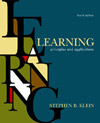| associative-link expectancy | A representation containing knowledge of the association of two events that occur together.
|
 |
 |
 |
| attributional style | a consistent way of explaining the outcomes of various situations
|
 |
 |
 |
| behavioral autonomy | A situation in which the continued reinforcement of a specific behavior leads to the occurrence of the response despite a devalued reinforcer.
|
 |
 |
 |
| behavior-reinforcer expectancy | a belief that a specific behavior causes the occurrance of a specific reinforcer
|
 |
 |
 |
| cognition | An understanding or knowledge of the structure of the psychological environment.
|
 |
 |
 |
| efficacy expectancy | A feeling that one can or cannot execute a particular behavior.
|
 |
 |
 |
| expectancy | A mental representation of event contingencies.
|
 |
 |
 |
| external attribution | A belief that events are beyond one's control.
|
 |
 |
 |
| global attribution | The assumption that a specific outcome will be repeated in many situations.
|
 |
 |
 |
| hopelessness | The belief that positive events will not occur or that negative events cannot be controlled.
|
 |
 |
 |
| hopelessness depression | A form of clinical depression that is produced by the belief that positive events will not occur or that negative events cannot be controlled.
|
 |
 |
 |
| internal attribution | The assumption that personal factors lead to a particular outcome.
|
 |
 |
 |
| irrelevant incentive effect | The acquisition of an excitatory link expectancy that a particular stimulus is associated with a specific reinforcer under an irrelevant drive state.
|
 |
 |
 |
| learned helplessness | The belief that events are independent of behavior and are uncontrollable, which results in emotional trauma as well as motivational and cognitive deficits.
|
 |
 |
 |
| modeling | The acquisition of behavior as a result of observing the experiences of others.
|
 |
 |
 |
| personal helplessness | A perceived incompetency that leads to failure and feelings of helplessness.
|
 |
 |
 |
| reinforcer devaluation effect | The association of a reinforcer with an aversive event, which reduces the behavioral control that reinforcer exerts.
|
 |
 |
 |
| response-outcome expectancy | The belief that a particular response leads to a specific consequence or outcome.
|
 |
 |
 |
| specific attribution | The belief that a particular outcome is limited to a specific situation.
|
 |
 |
 |
| stable attribution | The assumption that the factors that resulted in a particular outcome will not change.
|
 |
 |
 |
| stimulus-outcome expectancy | The belief that a particular consequence or outcome will follow a specific stimulus.
|
 |
 |
 |
| universal helplessness | A belief that environmental forces produce failure and result in helplessness.
|
 |
 |
 |
| unstable attribution | The belief that other factors may affect outcomes in the future.
|



 2002 McGraw-Hill Higher Education
2002 McGraw-Hill Higher Education